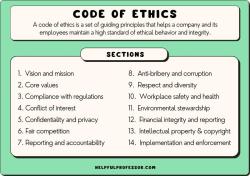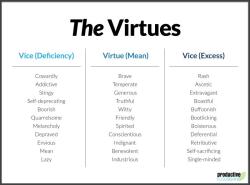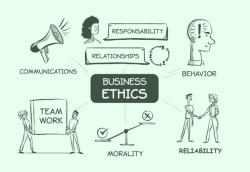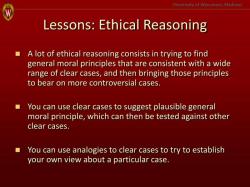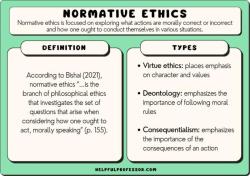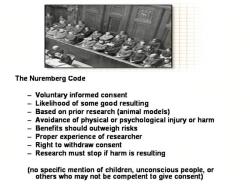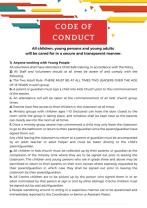What is the meaning of the Code of ethics?
A Code of Ethics is a set of principles or guidelines that outlines expected behaviors, values, and standards for individuals or members of a particular profession, organization, or community. The purpose of a Code of Ethics is to provide a framework for ethical decision-making and to establish a common understanding of acceptable conduct. The meaning of a Code of Ethics can vary depending on its context, but there are several common elements:
Guidance for Behavior:
- A Code of Ethics serves as a guide for behavior by setting forth principles and standards that individuals or members of a group are expected to follow. It helps individuals navigate ethical dilemmas and make decisions aligned with ethical values.
Establishing Values:
- The Code of Ethics reflects the values and moral principles considered important by a profession, organization, or community. It articulates the shared beliefs that underpin ethical conduct.
Defining Acceptable Conduct:
- It defines what is considered acceptable and unacceptable conduct within a specific context. This helps create a common understanding of ethical boundaries and expectations.
Promoting Accountability:
- A Code of Ethics promotes accountability by establishing a set of standards against which individuals can be held responsible for their actions. Violations of the code may result in consequences or disciplinary measures.
Building Trust and Credibility:
- Adherence to a Code of Ethics helps build trust and credibility. Stakeholders, whether they are clients, customers, colleagues, or the public, are more likely to trust individuals or organizations that demonstrate a commitment to ethical behavior.
Professionalism and Integrity:
- For professional organizations, a Code of Ethics is often a cornerstone of professionalism. It emphasizes the importance of maintaining integrity, honesty, and ethical conduct in all professional activities.
Mitigating Ethical Risks:
- By providing guidelines for ethical behavior, a Code of Ethics helps mitigate ethical risks. It encourages individuals to identify potential ethical challenges in advance and to take steps to avoid or address them.
Educational Tool:
- A Code of Ethics serves as an educational tool, helping to inform individuals about the ethical standards and expectations of a profession or organization. It contributes to the ongoing ethical development of individuals within a community.
Reflecting Social Values:
- The Code of Ethics often reflects broader social values and expectations. It acknowledges the role of individuals and organizations in contributing positively to society and maintaining a level of social responsibility.
Adaptability and Evolution:
- A Code of Ethics is not static; it can evolve over time to reflect changes in societal norms, technological advancements, and ethical considerations. It is a living document that may be periodically revised to address emerging ethical challenges.
In summary, the meaning of a Code of Ethics lies in its role as a foundational document that guides ethical behavior, establishes values, and promotes accountability and trust within a given context. It is a tool for fostering a culture of integrity, responsibility, and ethical decision-making.
The Significance and Application of Codes of Ethics: Guiding Conduct Across Professions
1. Definition of "Code of Ethics":
A Code of Ethics is a formal document outlining a set of ethical principles and professional standards expected of individuals within a specific field or organization. It serves as a guide for ethical decision-making and promotes responsible behavior that aligns with the profession's values and mission.
2. Application in Various Fields:
Codes of Ethics are widely adopted across diverse professional fields, including:
- Medicine: The Hippocratic Oath and various medical codes guide doctors in their ethical responsibilities towards patients.
- Law: The American Bar Association's Model Rules of Professional Conduct set ethical standards for lawyers to uphold client confidentiality and maintain professional integrity.
- Engineering: Codes of ethics for engineers emphasize public safety, environmental responsibility, and professional competence.
- Journalism: Ethical guidelines for journalists promote accuracy, fairness, and responsible reporting practices.
- Business: Corporate codes of ethics address ethical conduct in business dealings, including ethical marketing, fair labor practices, and responsible corporate governance.
3. Role in Regulating Conduct:
Codes of Ethics play a crucial role in regulating conduct and behavior by:
- Establishing Clear Expectations: They provide a clear framework for what constitutes ethical behavior within a specific domain, minimizing ambiguity and confusion.
- Promoting Accountability: They set standards for professional accountability and serve as a basis for disciplinary action against individuals who violate the code.
- Encouraging Ethical Decision-Making: They offer guidance for individuals to navigate complex ethical dilemmas and make informed choices aligned with the code's principles.
- Building Trust and Credibility: Adherence to a code of ethics promotes public trust in professionals and organizations, signifying their commitment to ethical conduct and professional responsibility.
- Promoting Consistency and Fairness: Applying the same code to all members of a profession promotes consistency and fairness in ethical standards and decision-making.
- Promoting Continuous Improvement: Codes of ethics are often reviewed and updated to reflect evolving societal norms and ethical considerations, ensuring ongoing improvement and adaptation.
Overall, Codes of Ethics serve as essential tools for guiding ethical conduct, promoting responsible behavior, and upholding professional standards across diverse fields. Their presence fosters trust, accountability, and a culture of ethical decision-making within professions and organizations.



